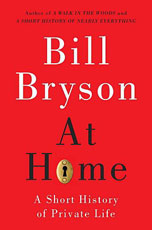"So I thought it might be interesting, for the length of a book, to consider the ordinary things in life, to notice them for once and treat them as if they were important, too. Looking around my house, I was startled and somewhat appalled to realize how little I knew about the domestic world around me. Sitting at the kitchen table one afternoon, playing idly with the salt and pepper shakers, it occurred to me that I had absolutely no idea why, out of all the spices in the world, we have such an abiding attachment to those two. Why not pepper and cardamom, say, or salt and cinnamon? And why do forks have four tines and not three or five? There must be reasons for these things. Dressing, I wondered why all my suit jackets have a row of pointless buttons on every sleeve. I heard a reference on the radio to someone paying for room and board, and realized that when people talk about room and board, I have no idea what the board is that they are talking about. Suddenly the house seemed a place of mystery to me.
"So I formed the idea to make a journey around it, to wander from room to room and consider how each has featured in the evolution of private life. The bathroom would be a history of hygiene, the kitchen of cooking, the bedroom of sex and death and sleeping, and so on. I would write a history of the world without leaving home.
"The idea had a certain appeal, I must say. I had recently done a book in which I tried to understand the universe and how it is put together, which was a bit of an undertaking, as you will appreciate. So the idea of dealing with something as neatly bounded and cozily finite as an old rectory in an English village had obvious attractions. Here was a book I could do in carpet slippers.
"In fact it was nothing like that. Houses are amazingly complex repositories. What I found, to my great surprise, is that whatever happens in the world — whatever is discovered or created or bitterly fought over — eventually ends up, in one way or another, in your house. Wars, famines, the Industrial Revolution, the Enlightenment — they are all there in your sofas and chests of drawers, tucked into the folds of your curtains, in the downy softness of your pillows, in the paint on your walls and the water in your pipes. So the history of household life isn't just a history of beds and sofas and kitchen stoves, as I had vaguely supposed it would be, but of scurvy and guano and the Eiffel Tower and bedbugs and body-snatching and just about everything else that has ever happened. Houses aren't refuges from history. They are where history ends up."
